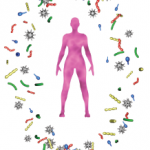Emerging research suggests that rheumatoid arthritis (RA) is associated with intestinal dysbiosis. This prospective pilot study evaluates changes in intestinal microbial composition in patients with RA initiating treatment with either methotrexate or a tumor necrosis factor (TNF) inhibitor.
Methods
Consecutive patients, fulfilling the 2010 ACR/EULAR classification criteria for RA, who started treatment with either methotrexate or a TNF inhibitor delivered a stool sample upon initiation of immunosuppression and again three months later. A 16S ribosomal RNA gene-based validated microbiota test (GA-map Dysbiosis Index Score [DIS], Genetic Analysis, Oslo, Norway) was used to evaluate for the presence and degree of dysbiosis. Fecal levels of Prevotella copri (P. copri) were analyzed by custom-made quantitative polymerase chain reaction. Changes in microbial composition were analyzed in relation to changes in disease activity, as measured by the disease activity score based on 28-joint counts, using C-reactive protein.
Results
At baseline, dysbiosis was present in 33 of 50 (66%) participants and more common in participants with more than two years of disease duration (P=0.019). At the three-month follow-up, 27 of 50 (54%) were good treatment responders and the DIS had improved in 14 of 50 (28%). Participants initiating a TNF inhibitor more often exhibited improvement in the DIS compared with those initiating methotrexate (P=0.031). P. copri was identified in 32 of 50 (64%) at baseline. An improvement in disease activity score based on 28-joint counts, using C-reactive protein was associated with a simultaneous decrease in P. copri abundance (rs=0.30, P=0.036).
Conclusion
This study affirms that dysbiosis is a feature of RA. Although patients were not randomized to methotrexate or a TNF inhibitor, the findings suggest that specific therapies may differentially modulate the gastrointestinal microbiota in RA. The association between P. copri and treatment response requires further study.
For complete details, including source material, refer to the full study.
Excerpted & Adapted From
Andréasson K, Olofsson T, Lagishetty V, et al. Treatment for rheumatoid arthritis associated with alterations in the gastrointestinal microbiota. ACR Open Rheumatol. 2024;6:421–427.



